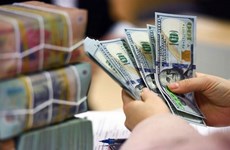Soft inflation may ease money policy
Persistently soft inflation may encourage further money easing in
Vietnam, ANZ Bank states in an economic update dated May 8.
Persistently soft inflation may encourage further money easing in
Vietnam, ANZ Bank states in an economic update dated May 8.
April headline inflation was at 4.45 percent year-on-year, with a sequential marginal gain of 0.08 percent month-on-month. Inflation undershoots market expectations, reflecting weak domestic demand.
In a bid to nudge credit growth, the State Bank of Vietnam (SBV) in March slashed its refinancing rate by 50 basis points to 6.5 percent, and reduced caps on various deposit rates. It had earlier planned to reduce interest rates by 150-200 basis points throughout the year.
"We remain of the view that further policy easing would have a limited impact on credit growth due to tight credit supply as banks continue to grapple with high bad debt ratios," the report said.
The central bank estimates non-performing loans (NPLs) at 308 trillion VND, or 14.7 billion USD, by the end of February, about 9.71 percent of the total loan books in the system.
Despite the decrease in the refinancing rate, credit barely rose 0.62 percent as of mid-April. Due to the lack of credit, failures of local business continue to rise.
According to the Department of Business Registration Management, total dissolution of enterprises or temporary suspension of operations reached 21,500 in the first quarter of this year, rising by 9.4 percent over the same period last year.
The report said, while banks remain hesitant to extend credit as most borrowers fail to present feasible plans to clear inventory, domestic liquidity remained ample with increasing deposits, healthy foreign direct investment inflows, and the manageable external trade.
ANZ expects the weak growth in domestic demand to remain within the next three to four years, while the robust backdrop provided by the external sector will underpin overall growth prospects.-VNA
April headline inflation was at 4.45 percent year-on-year, with a sequential marginal gain of 0.08 percent month-on-month. Inflation undershoots market expectations, reflecting weak domestic demand.
In a bid to nudge credit growth, the State Bank of Vietnam (SBV) in March slashed its refinancing rate by 50 basis points to 6.5 percent, and reduced caps on various deposit rates. It had earlier planned to reduce interest rates by 150-200 basis points throughout the year.
"We remain of the view that further policy easing would have a limited impact on credit growth due to tight credit supply as banks continue to grapple with high bad debt ratios," the report said.
The central bank estimates non-performing loans (NPLs) at 308 trillion VND, or 14.7 billion USD, by the end of February, about 9.71 percent of the total loan books in the system.
Despite the decrease in the refinancing rate, credit barely rose 0.62 percent as of mid-April. Due to the lack of credit, failures of local business continue to rise.
According to the Department of Business Registration Management, total dissolution of enterprises or temporary suspension of operations reached 21,500 in the first quarter of this year, rising by 9.4 percent over the same period last year.
The report said, while banks remain hesitant to extend credit as most borrowers fail to present feasible plans to clear inventory, domestic liquidity remained ample with increasing deposits, healthy foreign direct investment inflows, and the manageable external trade.
ANZ expects the weak growth in domestic demand to remain within the next three to four years, while the robust backdrop provided by the external sector will underpin overall growth prospects.-VNA













